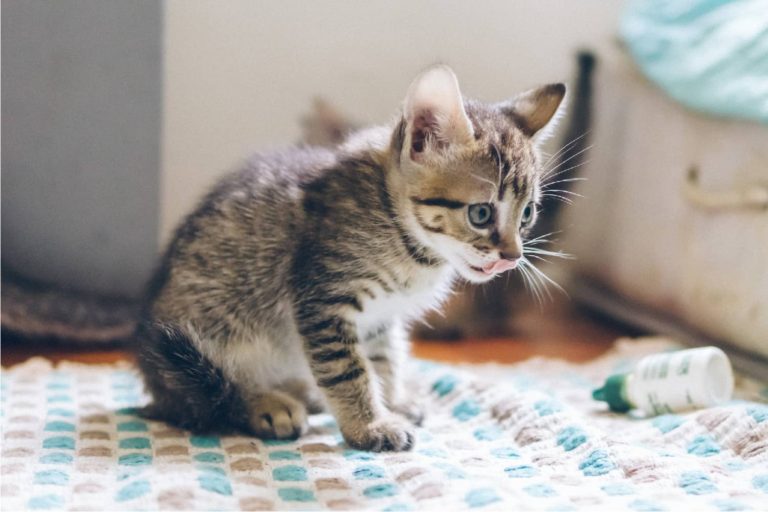Imagine coming home after a long day, eager to relax and cuddle with your furry friend, only to be greeted by a pungent odor and a damp spot on your rug. It’s a scene that’s all too familiar for many cat owners, and it’s often accompanied by a feeling of confusion and frustration. Why is your cat suddenly peeing outside the litter box? Is something wrong?

Image: knutsfordvetsurgery.co.uk
The truth is, there are a myriad of reasons why cats might start urinating outside their designated areas. While it can be alarming, it’s crucial to remember that it’s a communication from your cat, telling you something isn’t quite right. Understanding these underlying causes is the first step towards resolving the issue and restoring harmony in your home.
Unraveling the Mystery: Why Your Cat Might be Peeing on the Floor
Before diving into the potential culprits, it’s important to note that the act of urinating outside the litter box is often referred to as “inappropriate urination” in veterinary terms. This phrase highlights the fact that the behavior isn’t necessarily intentional on the cat’s part. It often stems from a combination of physical, behavioral, and environmental factors.
1. Medical Conditions:
Just like humans, cats can experience various health issues that affect their urinary system. Some of the most common medical reasons for inappropriate urination include:
-
Urinary Tract Infections (UTIs): UTIs are bacterial infections that can cause pain, discomfort, and frequent urination. Cats with UTIs may urinate more often, in smaller amounts, and even outside the litter box. Symptoms like blood in the urine, straining to urinate, and lethargy can also accompany a UTI.
-
Feline Lower Urinary Tract Disease (FLUTD): FLUTD is a complex condition that can encompass several urinary tract problems, from inflammation to blockages. If your cat suffers from FLUTD, they might experience pain during urination, leading to hesitation and potentially marking outside the litter box.
-
Kidney disease: Kidney disease can also affect a cat’s ability to control their urination. If the kidneys aren’t functioning properly, cats may urinate more frequently, produce excessive amounts of urine, and even have accidents outside the litter box.
-
Diabetes: Diabetes can lead to increased thirst and urination, which can sometimes result in accidents.
-
Hyperthyroidism: This condition can cause increased thirst and urination, similar to diabetes.
2. Behavioral Issues:
Sometimes, inappropriate urination is a response to stress or anxiety in cats. These behavioral triggers can stem from:
-
Stressful life changes: Introducing new pets or people into the household, moving to a new home, or even rearranging furniture can cause stress for cats, leading to anxiety and potential urination problems.
-
Territorial disputes: If your cat feels threatened by another pet in the house, they may mark their territory with urine. This is particularly common in multi-cat households.
-
Litter box aversion: Cats are notoriously picky about their litter box setup. If the litter box is dirty, doesn’t have the right type of litter, is in a location that makes your cat uncomfortable, or if there aren’t enough litter boxes for the number of cats, they may choose to urinate elsewhere.
-
Environmental changes: Even small changes in the environment, like switching to a new type of litter, moving the litter box, or changes to the cleaning routine, can make your cat uncomfortable and trigger urination issues.

Image: catflavor.com
3. Age-Related Changes:
-
Cognitive decline: Older cats may experience cognitive decline, which can lead to confusion and difficulty remembering where the litter box is located.
-
Physical limitations: As cats age, they may develop arthritis or other physical limitations that make it difficult for them to reach the litter box, leading to accidents.
Decoding the Clues: Understanding Your Cat’s Communication
It’s crucial to observe your cat’s behavior carefully to better understand the root of the problem. Consider these factors:
-
Frequency and location: Is it a one-time occurrence, or is your cat consistently peeing outside the litter box? Are they choosing a specific spot, or is it random?
-
Body language: Does your cat seem anxious, stressed, or in pain? Are they avoiding the litter box, or are they having trouble using it?
-
Other symptoms: Are you noticing any other changes in your cat’s behavior, like decreased appetite, lethargy, or changes in their grooming habits?
Taking Action: A Comprehensive Approach to Solving the Problem
Now that you have a better understanding of the potential causes, it’s time to take action. Here’s a step-by-step guide:
-
Rule Out Medical Issues: The first step is to rule out any underlying medical conditions. Schedule an appointment with your veterinarian for a thorough checkup. They can conduct physical exams, urine tests, and potentially x-rays or ultrasounds to diagnose any medical problems.
-
Address the Litter Box: If your cat’s behavior is stemming from litter box aversion, it’s crucial to address the issue immediately.
-
Location: Ensure the litter box is placed in a quiet, private area of your home, away from high-traffic zones, food and water bowls, and noisy appliances.
-
Number: If you have multiple cats, make sure you have at least one litter box per cat, plus one extra.
-
Type of litter: Cats are picky about litter. Experiment with different types until you find one that your cat enjoys. Consider options like unscented, clumping clay, or even silica gel.
-
Cleaning: Keep the litter box clean and fresh. Scoop it at least once a day, and give it a thorough cleaning at least once a week.
- Create a Stress-Free Environment: If your cat is stressed or anxious, there are several things you can do to help create a more calming environment.
-
Feliway diffuser: Feliway is a synthetic pheromone that mimics the natural calming pheromones that cats secrete. It can be used to create a relaxing atmosphere and help reduce stress in cats.
-
Provide plenty of hiding places: Cats need safe spaces to retreat to when they feel overwhelmed. Provide them with plenty of hiding places throughout your home, such as cat trees, cardboard boxes, or covered beds.
-
Reduce noise and commotion: Cats are sensitive to loud noises and chaotic environments. Try to reduce noise levels in your home, especially during periods when your cat is stressed.
- Consider Behavior Modification: If the issue persists, it may be necessary to work with a certified animal behaviorist to develop a behavior modification plan. They can use techniques like counter-conditioning and desensitization to help your cat overcome their anxiety or fear associated with urinating outside the litter box.
Expert insights:
Here are some tips from renowned veterinarian, Dr. Emily Carter:
“If your cat is peeing outside the litter box, the first thing to do is to rule out any medical conditions. Once you’ve addressed any medical concerns, you need to focus on the litter box environment. This includes making sure it’s clean, accessible, and appealing to your cat. If the problem persists, it’s important to consult with a veterinarian or an animal behaviorist to develop a customized plan to help your cat overcome their urination issues.”
Why Is My Cat Peeing On The Floor
A Message of Hope:
While it can be frustrating and disheartening, remember that inappropriate urination is a common problem that can often be resolved with patience, understanding, and the right approach. By working closely with your veterinarian and implementing the strategies outlined above, you can help your cat overcome this challenge and enjoy a happy, healthy life together.
The key is to be observant, patient, and persistent. Remember, your cat is communicating their needs, and understanding them is the first step towards solving the problem. Don’t hesitate to reach out to your veterinarian or an animal behaviorist for guidance and support—you’re not alone in this journey!






